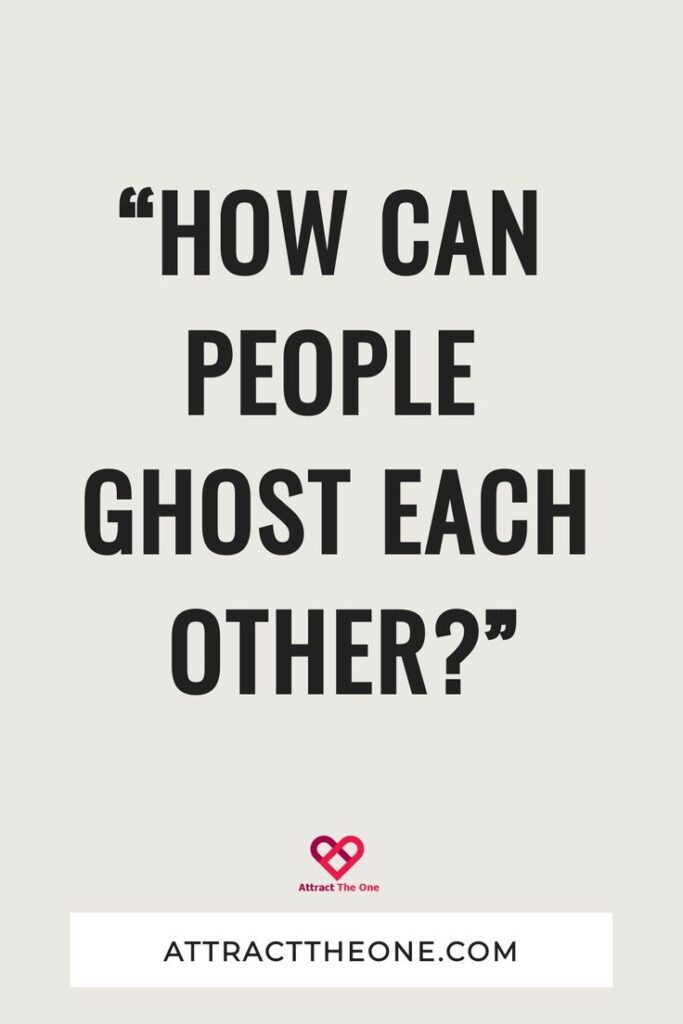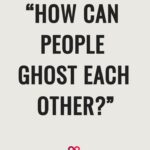A reader wonders how people can ghost each other in relationships and dating.
Hi Elizabeth,
I think one of the hardest things for us to wrap our heads around is that no one owes us anything. I learned this sentiment recently, and it’s SO hard!
I had someone significant in my life, start a conversation, share some information and then never continue the conversation. It’s been so frustrating dealing with the emotions coming up with it.
My biggest question is: HOW can people act this way [ghosting] and just move on with their lives like they’ve done absolutely nothing?
I really don’t get it!
Thank you for the response and I hope the reader finds solace at some point after being treated that way.
This question is in reference to someone else’s question about what to do after being ghosted by her co-worker here.
You’re absolutely right– no one owes you anything.
It’s an interesting paradox how the more people believe they are owed something, the less they usually get that particular thing.
The fact that you were more invested in the relationship than the other person is clear from the way you asked the question:
“HOW can people act this way [ghosting] and just move on with their lives like they’ve done absolutely nothing?”
It’s so clear that I hesitate to mention it, but the fact you were more invested in the relationship is both why they CAN move on without batting an eyelash and why you’re upset about the behavior.
The “wrong” that’s being done is located inside the mind of the person who perceives it as “wrong.”
People ghost and dump and leave people in sad and distressing ways because they are usually interested in exiting with the least amount of collateral damage to their own psyche.
Whether that’s by sitting their lover down and explaining the whole situation or simply choosing to never call back– most breakups and loss are sad and distressing for all involved.
There is no easy or kind way to handle, “I formerly enjoyed your company and now I feel better off without it.”
As I’m writing this, I’m tempted to go into a sidebar discussion about judgements around the behavior of ghosting. But I’ve decided against that because of people’s tendency to assume that people in their lives have made agreements they have not in fact created.
This, plus people’s tendency to use their hidden expectations as justification for their own pain is one of the biggest emotional problems people create for themselves.
Especially when they’re forming new relationships and dating.
When people “should” themselves about other people’s behavior, then notice the relationship isn’t what they hope for, they create their own pain.
That’s exactly what I’m trying to encourage you to avoid– which is why I’m not going there.
Another common way people upset themselves is to remain invested in their own side of the story without thinking things through from the other person’s perspective.
Often two people have VERY different perceptions of both what their relationship actually IS and what’s happening between them. This leads to every possible misunderstanding. Perception is not reality.
This is true whether they just started a relationship or they’ve been married 50 years.
Two people’s ideas of what’s acceptable, expected and desirable relationship behavior usually varies and changes based on their feelings toward their partner at any given moment.
In fact, the more similar the goals, expectations and desires between two people, the more effortless their relationship becomes. Because deep understanding helps prevent upset.
This extends to a behavior like ending a connection by ghosting and disappearing without feeling it necessary to have a whole conversation about “The End.”
One person’s heartless ghosting is another person’s merciful ending and another person’s cowardly exit.
If you’ve ever had someone read you the riot act about all the failures you’ve stacked up over the course of your relationship then leave you to lick your wounds with the intention of never speaking to you again– disappearing instead could actually be better.
It’s all about perspective.
Say two people are on different pages when it comes to dating each other.
I’ll use two fictional humans who have been dating for a few months and haven’t discussed their relationship.
Person A is having an okay time and admits they are enjoying themself moderately.
In person A’s mind, their relationship falls into “casual fling” territory.
In general, they’re mostly thinking about work or family or something random like how to gather up more ham sandwiches on the weekend.
Their general perspective is that dating this new person is fun and they are having a good time.
Person B has been hit by cupid’s arrow and is so in love they’re having trouble eating and sleeping.
Their free time is spent daydreaming about this exciting new person.
There isn’t a conflict until one of them shares their unmet expectations with the other.
The fact that these two people aren’t on the same page about their feelings for each other does NOT prevent them from enjoying each other’s company– up until the point where their individual hopes, dreams and expectations collide with each other’s.
However, these two are going to have wildly different ideas, expectations, hopes and desires for the other person and their relationship based on where they are at any given time.
And their individual sets of anxieties, fears and goals are going to be triggered by wildly different conditions.
Imagine for a minute that we have to guess which person is going to feel more emotional pain if one of them leaves the relationship.
If you guessed person B, you’d be correct. Because of the high level of attachment that “falling in love” introduces.
If person B leaves the relationship, we don’t imagine casual person A to be nearly as upset about the loss.
Why?
Because person A’s emotional attachment and investment in the relationship didn’t hit a level that is likely to awaken all of their primal fear and loss programming.
Person A’s feelings of loss are much less strong– bordering on apathy because their attachment is lower.
But the condition– being left by a lover– is the same.
That’s clear from the outside but not as clear when it’s actually happening to us.
What seems WRONG AND AWFUL AND COMPLETELY UNREASONABLE can seem perfectly reasonable from a different perspective.
And this is where we often find ourselves when it comes to breakups.
MORE: 6 Habits of Magnetically Attractive Women












